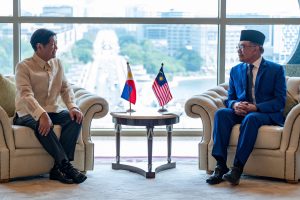Southeast Asian governments should be given some latitude to engage informally with Myanmar’s military junta in order to nudge the country’s metastasizing conflict toward a solution, the leaders of Malaysia and the Philippines said yesterday.
The comments came after a meeting between Malaysian Prime Minister Anwar Ibrahim and visiting Philippine President Ferdinand Marcos Jr. in Putrajaya, during which the pair reportedly spoke about the need to strengthen the role of the Association of Southeast Asian Nations (ASEAN) in resolving the conflict.
Myanmar has been aflame since the military seized power in February 2021, overthrowing Aung San Suu Kyi’s elected government. The coup has led to the emergence of a broad revolutionary front that is aiming to extricate the military from the country’s politics once and for all.
While emphasizing the importance of ASEAN’s role, The Associated Press reported, Anwar told reporters after the meeting that neighboring countries should be given “some flexibility, room, and space” to engage with the military administration on an informal basis.
Marcos did not mention Myanmar by name but agreed that countries should be able to use the bilateral route to resolve problems. “I think that this will be an important aspect to all the issues that ASEAN is presently facing and to all the issues that the member states are presently worrying about,” he said.
The comments appear to mark a shift in the approaches of Malaysia and the Philippines, which have been among the ASEAN member states that have been most critical of the military junta and most supportive of ASEAN’s central role in ending the crisis.
While Anwar said that such bilateral approaches must not come at the expense of “sacrificing the issues of human rights and the treatment of minorities,” it remains to be seen the extent to which this can be possible. The suggestion comes amid a controversy over Thailand’s solo initiative to convene its own freelance Myanmar initiative, alongside the ASEAN-led process that is being led by current chair Indonesia. The diplomatic initiative began in December and has since involved four meetings, including two at the ministerial level. Unlike ASEAN’s process, which has excluded the junta’s senior leadership from its summits since late 2021, the Thai process has included the junta’s foreign minister. This push, which culminated in a meeting between Thai Foreign Minister Don Pramudwinai and imprisoned leader Aung San Suu Kyi on July 9, has attracted widespread criticism for undermining ASEAN’s own efforts to solve the crisis via the Five-Point Consensus.
The Thai initiative showed that there is a fine line – a vanishingly fine one – between initiatives that make headway and those that undermine the already shaky regional effort to resolve or ameliorate Myanmar’s conflict.
It is hard to see how any ASEAN official will convince junta leader Senior Gen. Min Aung Hlaing to forswear his goal of eliminating the “terrorists” who are opposing his rule. Indeed, it is much more likely that the military establishment, as with the Thai initiative, will manipulate such bilateral approaches to its own advantage, as with the Thai process, in order to sideline ASEAN’s diplomatic initiative and buy the time needed to crush those opposing its rule. It remains unclear whether the benefits of informal approaches wouldn’t benefit the military administration more than the cause of peace.
The comments by Marcos and Anwar are perhaps best seen as a reflection of ASEAN’s failures to date, and the urgent need for new approaches. Indeed, if bilateral engagements are a risky alternative or supplement, the fact that they are being suggested appears to reflect the bloc’s essential powerlessness to compel the cooperation of its recalcitrant member. Treating the military junta as a good-faith partner of peace, as ASEAN has attempted to do via the Five Point Consensus since April 2021, has clearly done little to resolve the country’s zero-sum conflict. Yet it is hard to see a hardline ASEAN position, assuming the consensus for one could be mustered, being much more successful.
As more time goes by, and ASEAN continues to fail to make headway on the implementation of the Five-Point Consensus, such sideline approaches will probably become normalized.

































